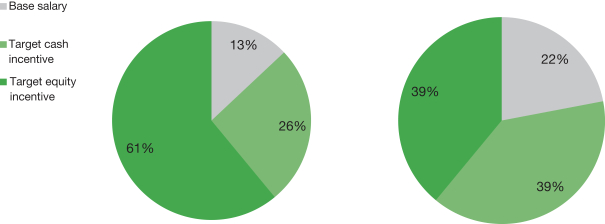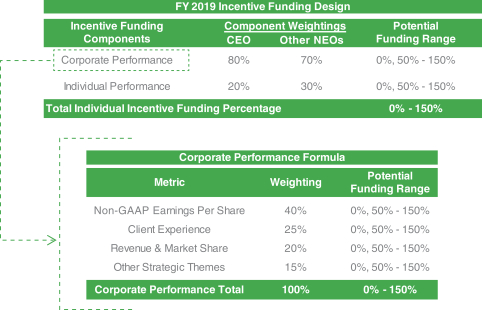Executive Compensation and Related Information
Under the RSU and PRSU award agreements, a change in control will not be deemed to occur, for purposes of the treatment described in the award agreement in connection with a change in control, if TD Bank Financial Group acquires the Company’s outstanding shares of common stock or substantially all of the Company’s assets.
Under the PRSU award agreements, “retirement” generally means a termination by the Company of the executive’s employment with the Company other than for cause, death or disability after the executive has attained at least age 55 and at least ten years of continuous service with the Company. With respect to Mr. Hockey, if Mr. Hockey has served as CEO for at least five years, then the term “Retirement” under his PRSUs will have the same meaning as under his employment agreement.
Under the RSU award agreements (other than for Mr. Hockey), “retirement” generally means a termination by the Company of the executive’s employment with the Company other than for cause after the executive has attained age 55 and at least ten years of continuous service with the Company.
Under the RSU and PRSU award agreements (other than with respect to Mr. Hockey’s awards), “cause” generally means:
| • | | failure to substantially perform the executive’s duties as an employee, other than due to illness, injury or disability; |
| • | | willfully engaging in conduct which is materially injurious to the Company; |
| • | | misconduct involving serious moral turpitude, or any conviction of, or plea of no contest to, a criminal offense arising out of a breach of trust, embezzlement or fraud committed against the Company by the executive in the course of his employment with the Company; |
| • | | any violation of thenon-solicitation ornon-competition covenants under the award agreement; or |
| • | | any other action that might be considered gross misconduct under the Company’s applicable associate handbook. |
Under Mr. Hockey’s RSU, PRSU and option award agreements, “cause” and “good reason” generally have the same meaning as provided in Mr. Hockey’s employment agreement.
Company Severance Practices
In addition, in accordance with the Company’s executive compensation practices, unless otherwise specified in an employment agreement, named executive officers will generally receive the following severance benefits upon any termination by the Company without cause including following a change in control: (a) four weeks of base salary for each completed year of service (or minimum of 12 weeks), up to a maximum of 104 weeks, (b) four weeks of annual cash incentive for each completed year of service, up to a maximum of 104 weeks, calculated based on target performance, (c) continued Company-paid employer portion of premium costs for medical and dental coverage for a period equal to one month for each completed year of service (or minimum of six months), up to a maximum of 18 months, and (d) eligibility to receive the cash portion of annual incentive, based on actual performance and prorated for the period of the fiscal year that the named executive officer remained employed. These severance benefits are subject to a release of claims in favor of the Company, andnon-competition andnon-solicitation obligations for a period of 12 months following termination of employment.
Employment Agreements of Named Executive Officers
President and CEO – Tim Hockey
On November 9, 2015, Mr. Hockey entered into an employment agreement under which he became the Company’s president effective January 2, 2016, and CEO effective October 1, 2016. Below is a brief summary of certain terms of his employment agreement.
Severance benefits under his employment agreement are summarized further below under the section titled “Summary Table – Potential Payments Upon Termination or Change in Control.”
| | | | |
| | TD Ameritrade2019 Proxy Statement | | 41 |
























